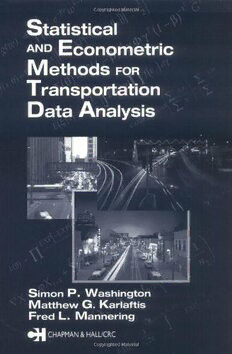Download Statistical and Econometric Methods for Transportation Data Analysis PDF Free - Full Version
Download Statistical and Econometric Methods for Transportation Data Analysis by Simon P. Washington Matthew G. Karlaftis Fred L. Mannering in PDF format completely FREE. No registration required, no payment needed. Get instant access to this valuable resource on PDFdrive.to!
About Statistical and Econometric Methods for Transportation Data Analysis
As the field of transportation moves toward the "total quality management" paradigm, performance-based outcomes and quantitative measures have become increasingly important. Measuring performance in the field depends heavily on modeling trends and data, which in turn requires powerful, and flexible analytical tools. To date, however, transportation professionals have lacked a unified, rigorous guide to modeling the wide range of problems they encounter in the field. Statistical and Econometric Methods for Transportation Data describes the techniques most useful for modeling the many complex aspects of transportation, such as travel demand, safety, emissions, and the environment. Taking care not to overwhelm readers with statistical theory, the authors clearly and concisely present the relevant analytical methods in quantitative chapters built on transportation case studies. Mastering this material enables readers to:Formulate research hypothesesIdentify appropriate statistical and econometric modelsAvoid common pitfalls and misapplications of statistical methodsInterpret model results correctlyIdeal as both a textbook and reference, this book makes three unique contributions to transportation practice and education. First, it presents a host of analytical techniques-both common and sophisticated-used to model transportation phenomena. Second, it provides a wealth of examples and case studies, and third, it specifically targets present and future transportation professionals. It builds the foundation they need not only to apply analytical models but also to understand and interpret results published elsewhere.
Detailed Information
| Author: | Simon P. Washington Matthew G. Karlaftis Fred L. Mannering |
|---|---|
| Publication Year: | 2003 |
| ISBN: | 9780203620106 |
| Pages: | 413 |
| Language: | English |
| File Size: | 1.968 |
| Format: | |
| Price: | FREE |
Safe & Secure Download - No registration required
Why Choose PDFdrive for Your Free Statistical and Econometric Methods for Transportation Data Analysis Download?
- 100% Free: No hidden fees or subscriptions required for one book every day.
- No Registration: Immediate access is available without creating accounts for one book every day.
- Safe and Secure: Clean downloads without malware or viruses
- Multiple Formats: PDF, MOBI, Mpub,... optimized for all devices
- Educational Resource: Supporting knowledge sharing and learning
Frequently Asked Questions
Is it really free to download Statistical and Econometric Methods for Transportation Data Analysis PDF?
Yes, on https://PDFdrive.to you can download Statistical and Econometric Methods for Transportation Data Analysis by Simon P. Washington Matthew G. Karlaftis Fred L. Mannering completely free. We don't require any payment, subscription, or registration to access this PDF file. For 3 books every day.
How can I read Statistical and Econometric Methods for Transportation Data Analysis on my mobile device?
After downloading Statistical and Econometric Methods for Transportation Data Analysis PDF, you can open it with any PDF reader app on your phone or tablet. We recommend using Adobe Acrobat Reader, Apple Books, or Google Play Books for the best reading experience.
Is this the full version of Statistical and Econometric Methods for Transportation Data Analysis?
Yes, this is the complete PDF version of Statistical and Econometric Methods for Transportation Data Analysis by Simon P. Washington Matthew G. Karlaftis Fred L. Mannering. You will be able to read the entire content as in the printed version without missing any pages.
Is it legal to download Statistical and Econometric Methods for Transportation Data Analysis PDF for free?
https://PDFdrive.to provides links to free educational resources available online. We do not store any files on our servers. Please be aware of copyright laws in your country before downloading.
The materials shared are intended for research, educational, and personal use in accordance with fair use principles.

